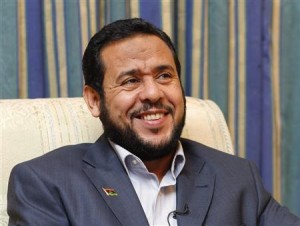By Michel Cousins.
Paris, 6 February 2015:
Interior Minister Omar Al-Sinki who arrived in Paris on Wednesday for talks with the French government, . . .[restrict]has called for the UN-brokered dialogue talks to be held in Misrata, his home town. However, he accused hardline Misratan political figures Abdurrahman Sewehli and Salah Badi of trying to sabotage the process.
He also said that Khalifa Hafter had “no role in Libya’s future”, accusing him of being a dictator in the making and of having planned to kidnap the government.
In an interview with French daily newpaper Le Monde published today, Sinki said that there had been talks with Misratan leaders about holding the dialogue there and that “we had an agreement that they withdraw from the Sidra oil terminal”. However, Badi and Sewehli “want to destroy this agreement”, he stated, pinning the blame for Tuesday’s attack on the terminal in which many Misratan fighters died on Badi personally.
He accused Qatar of supporting him.
Nonetheless, despite the attack, he believed that “logic was beginning to prevail” in Misrata.
As regards Hafter, he said that he had to be isolated “or he will isolate us”.
The general, he declared, “ considers himself to be a one-man government and has no respect for the army”. He added that he had spoken to Hafter on several occasions to try and find a solution to the security crisis and that Hafter had told him that he wanted to be president.
“I told him that, for that, he had to offer himself for election,” Sinki said, adding that Hafter would be remunerated if he agreed to be part of the national army.
“But he decided all by himself to announce his victory in Benghazi without referring to the authorities. Last week, during a meeting of the government, he tried to kidnap the ministers,” he revealed. “I’ve taken precautions to protect the government.”
On the subject of a government of national unity, Sinki stated that he fully supported the efforts of those involved in UN-brokered dialogue to create such a body, adding that he would be the first to resign to make way for it if the dialogue came up with a workable proposal. But such a government had to exclude not only Qaddafi-era figures and Islamist extremists, he said; there could be no place for Libya Dawn leaders either. “They have committed too many crimes against people,” he said. The Muslim Brotherhood in particular, he claimed, was interested “in money and power” only. Having lost the elections, “they have neither power nor money, so they make war”.
He also accused Libya Dawn of aiding and abetting Islamist militant such as those supporting the Islamic State. “They give them weapons and help to heal their wounded.”
As for the reconstituted Congress, the reason it did not want to take part in the dialogue in Geneva was because it considered it alone had political legitimacy. “That is false,” he said.
“We do not accept the General National Congress. It has no legitimacy and we want it to cease sitting. We accept the dialogue, but on condition that the legitimacy of the Tobruk authorities is accepted, that Daesh (the Islamic State) and the Islamist extremists are excluded because they’ve committed too many crimes, and likewise figures from the Qaddafi era; they stole the Libyan’s money. They have first to be brought to trial and judged.”
Asked about the proposal that an UN force be sent to Libya to ensure peace once a national unity government had been agree, Sinki was opposed.
“We do not want foreign military intervention missions or peacekeeping. We will handle everything ourselves,” he said. “A solution can be found. Soon the government will return to Tripoli. We will manage the control of the borders with neighbouring countries.”
His government was, however, looking to France to help in the matter. “We’re talk to Paris about it sending the technical means to control the borders and for security.” A French general would shortly be advising Libya as to the mission, he divulged.
In a TV interview in France yesterday, Sinki thanked the country for its support of the Thinni government. It was essential, he said, both in the Security Council and because of its influence with Libya’s neighbours.
Meanwhile however, IS was spreading in Tripoli, he warned, accusing Congress and its president, Nuri Abu Sahmain, of effectively supporting it in both Benghazi and Derna. But Derna was being blockaded, he claimed, while Islamist leaders in Benghazi had largely been killed. There, Operation Dignity no longer effectively existed, he declared. The LNA was under the control of the Chief of Staff, Major-General Abdul Razak Nazhuri and Libyan soldiers took their orders from him, he said.
On Libya’s need for weapons to continue fighting terrorism, he also said in the interview with Le Monde that despite calls by the Arab League last month for these to be delivered, nothing had happened. “We negotiated with the United Arab Emirates but they refused” because of the international embargo still in place.
Referring to Operation Barkhane set up by Sahel states and France to deal with the growing threat to the region by militant Islamists operating from southern Libya, he rejected the possibility of unilateral French strikes against them.
“There will be no bombing without our permission,” he said. “They may ask. We will negotiate and decide.” [/restrict]








